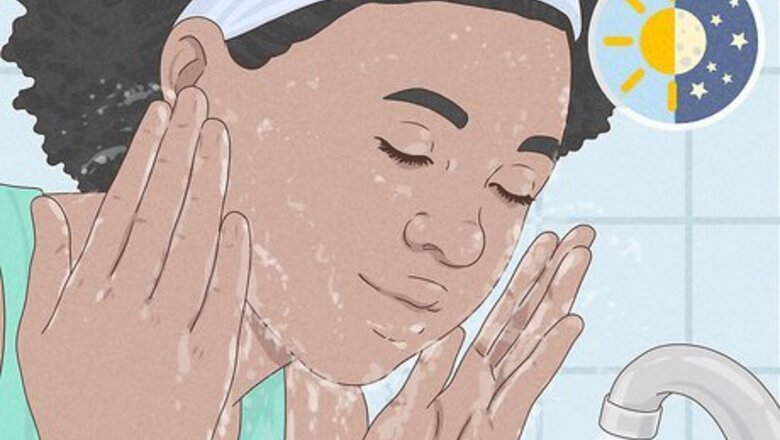
views
Creating a Daily Skin Care Routine
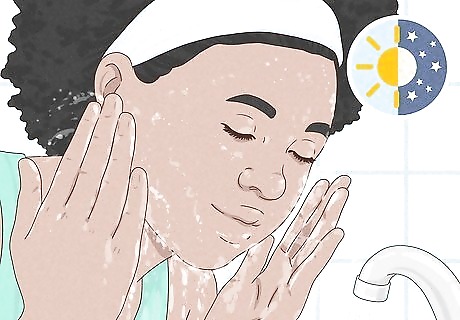
Wash your face in the morning and before bed. When you wake up in the morning, wash your face again to cleanse it of any oils and skin cells that have built up during the night. Then, wash your face again at night to remove any dirt, grime, oil, and makeup that could block your pores and cause acne while you're asleep. Pick skincare products that are formulated for your skin type. For instance, if your skin tends to get oily throughout the day, you might use a foaming cleanser and a lightweight moisturizer when you wash your face.
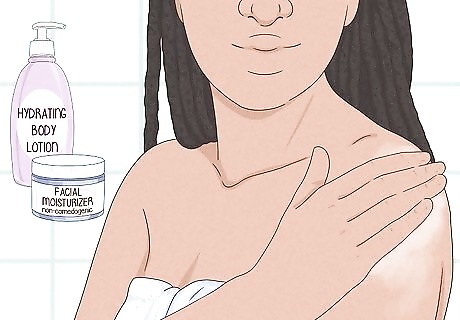
Use a hydrating lotion every time you wash your skin. While everyone benefits from a good lotion, dry skin can be more visible on black skin. Being vigilant about applying lotion is especially important to achieve beautiful black skin. You may need a separate moisturizer for your face and body. For your face, make sure to pick one that says it's non-comedogenic, as that's less likely to clog your pores. If you have especially dry skin, you may need to apply an oil or cream-based lotion at night. Night-time moisturizers are typically thicker than daytime formulas. In addition, they may contain products like retinol that can make your skin sensitive to the sun, so do not use them in place of a normal daytime product.
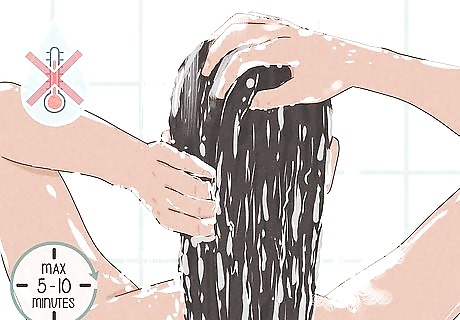
Skip the hot water when you shower. Use lukewarm water whenever you take a bath or a shower. While very hot water can feel good on your muscles, it can strip oils from your skin. That can lead your skin to feel uncomfortable and tight, and over time, it can even cause it to become dry and cracked. Also, try to keep your showers to about 5-10 minutes to avoid drying out your skin.
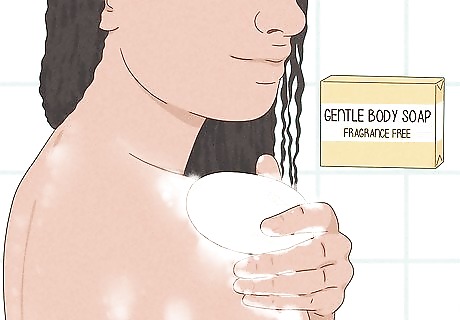
Pick a gentle body soap. Look for a soap that's labeled as "gentle" or "for sensitive skin. Harsh soaps can dry out your skin, causing you to need to use extra moisturizers to counteract that. For even more hydration, choose a soap that has added moisturizers.
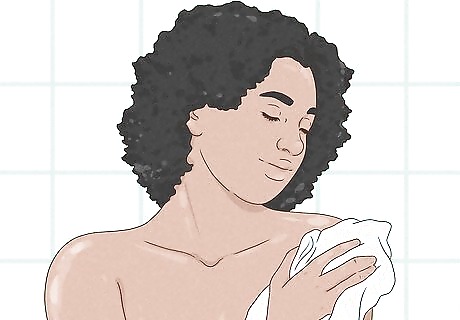
Blot your skin dry. Roughing up your skin with a towel after you get out of the shower will just agitate your skin and dry it out. Instead, gently blot your skin dry with your towel to keep your skin feeling soft and healthy. Also, use a plush towel with good absorbency, rather than a rough, threadbare towel that causes you to have to go over your skin more times.
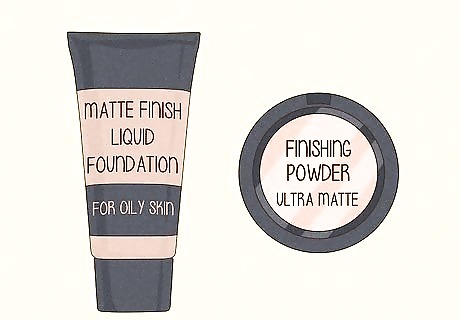
Pick the right makeup for your skin. Some Africans have oily skin paired with larger pores, and if you fall in this category, you need to make sure to pick a makeup built for that. Matte finish makeups are a great option because they can soak up oil while you're wearing them. On the other hand, if you have drier skin, then you definitely want to skip the matte foundation and go for something that has more weight to it. Pick something that's creamy instead.
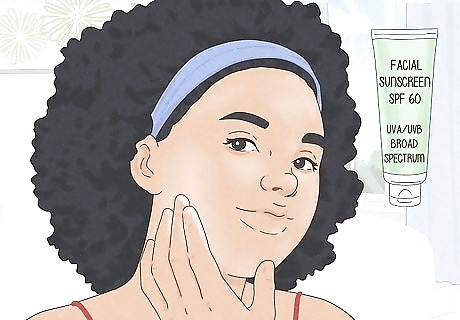
Protect your skin from the sun. While having dark skin does offer some protection from the sun, the sun can still damage your skin over time, and protecting your skin can keep it looking beautiful. every day, use a sunscreen that contains at least SPF 30 and that blocks both UVA and UVB rays. Also, try to pick one that is water resistant in case you sweat it off, and reapply it every 2 hours or after sweating, swimming, or drying off your skin. In addition: If you're going to be in the sun, cover your skin with tight-weave clothing, and wear a hat and sunglasses to protect your face. You can even find clothing with built-in skin protection. Avoid going outside as much as possible between the hours of 10 a.m. and 2 p.m., when the suns rays are at its strongest. If you do have to go outside, find shade or use an umbrella. Don't be fooled by the clouds. You can still get damaging rays on cloudy days. You can also get reflected sun off of light surfaces, such as snow, concrete, and any surface that is painted white or light colored. Tip: To protect your lips, look for a lip balm that contains sunscreen, as well.
Following a Healthy Lifestyle

Drink plenty of water throughout the day. If you're dehydrated, your skin is dehydrated, and if it gets too dry, it can become ashy. If you're a woman, you need about 11.5 cups (2,700 mL) of water a day, and if you're a man, you need about 15.5 cups (3,700 mL) each day. However, a good rule of thumb is to drink enough water so that you never feel thirsty during the day. Other beverages like tea and juice do count toward your water intake, though you should be aware that juice can add empty calories. If you have trouble getting enough water during the day, try carrying a reusable water bottle around with you, and fill it up whenever you get a chance. Try adding slices of fruits and veggies, like grapefruit, orange, and cucumbers, to make your water more refreshing.

Eat a diet rich in fruits and veggies. Getting all the right nutrients in your diet is an important step to creating beautiful skin. Make sure to include fruits and veggies at every meal. In addition, eat lean proteins such as chicken and fish; healthy fats like nuts, avocados, and fish; whole grains; and low-fat dairy. Avoid foods that are high in fats, sugars, and processed carbs, like chips, sodas, candy, fast food, and fried foods. Did You Know? Following a healthy diet can also help prevent acne.

Quit smoking cigarettes, if you use them. It can be really hard to quit, but if you want healthy skin, you should stop smoking or using any other products that contain nicotine. Cigarettes deprive your skin of oxygen. In turn, not as many nutrients are carried to your skin cells, which can result in more lines and wrinkles. If you need help quitting, talk to your doctor and ask your friends and family for support.
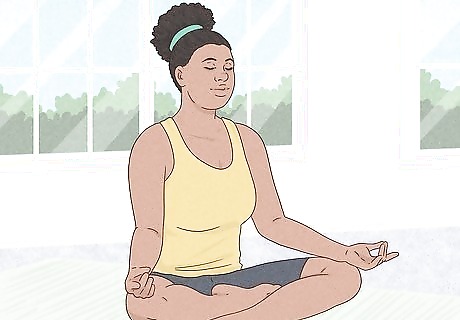
Keep stress under control. While you may know that stress can affect your health, you may not know that it can affect your skin. For instance, stress can cause acne breakouts on your face, which can then lead to scarring. One thing you can do to cut down on stress is to learn to say "no" when you have too much going on. If you're juggling a stressful situation at home and a new job, it's okay to say "no" to baking for the school bake sale. To help relieve stress, participate in hobbies you enjoy. Whether you like to bowl, paint, or watch movies, make sure to make time for the things you enjoy. You can also try practicing deep breathing when you find yourself stressed out. Take a moment to find a quiet place. Close your eyes, and focus on your breathing. Breathe in slowly, counting to 4 in your head. Then, breathe out, counting to 4 again. Keep it up until you feel calm down.
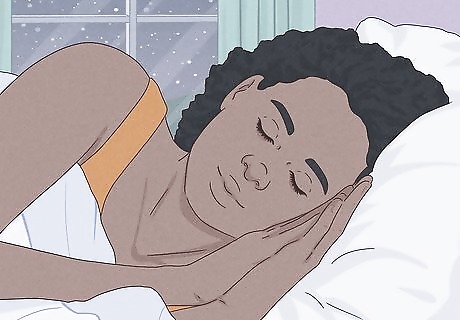
Get a good night's sleep every night. Sleep is essential for a lot of different reasons, but it can actually affect your skin health, as well. That's because sleep helps restore the balance of fluids in your body that are essential for healthy, glowing skin. In addition, getting plenty of sleep will help you handle stress better, which can also affect your skin.
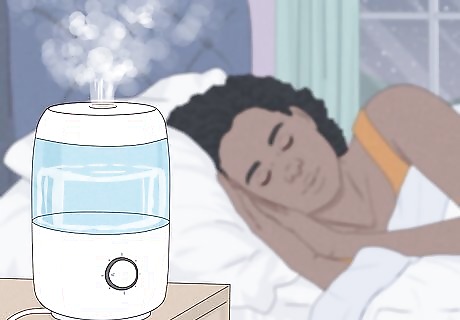
Add moisture to your home to combat dry skin. If you're struggling with dry skin, it can be beneficial to make your home more humid to help keep your skin from getting dry and ashy. Consider adding a humidifier to your bedroom to soak up the benefits of more humid air. While you can do this any time of year, it's especially beneficial during the dry winter months.
Dealing with Specific Skin Problems
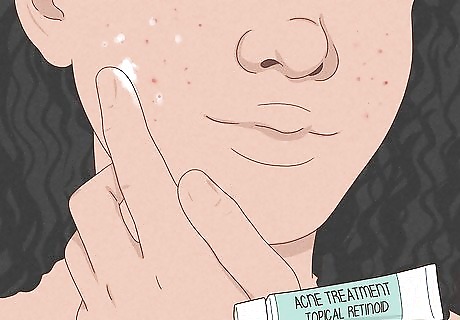
Treat acne promptly to prevent scarring. If you have dark skin and are prone to acne, you may have more inflammation when you get a bump. In turn, that can lead to dark marks and scarring, so you want to make sure to treat your acne as soon as you see a breakout to help lessen the effect. Start with topical creams, such as ones that contain retinoids, antibiotics, or benzoyl peroxide, although benzoyl peroxide can be irritating. Ask your doctor which treatment is best for you. You can also ask your doctor about an oral treatment, such as antibiotics or Accutane if your acne is particularly severe. Talk to your doctor or dermatologist about whether you should be using other skincare products to help fight your acne. For instance, some foundations have built-in ingredients, such as salicylic acid, to treat and prevent breakouts.
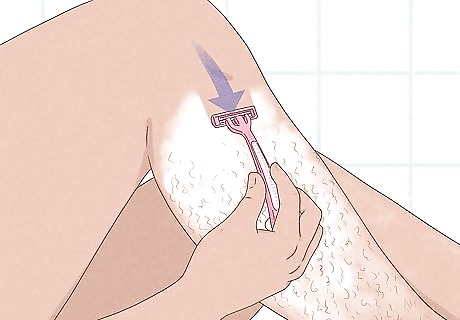
Shave in the direction of your hair to prevent razor bumps. To avoid getting painful, irritated razor bumps, always shave your hair in the direction that it's growing. Because African hair tends to be curly, the tip of the hair can grow back into the skin if it's been shaved too short. Using a safety razor and shaving every other day, rather than daily, can also help reduce razor bumps. If you do get razor bumps, you can treat them with topical ointments such as glycolic acid lotion or a topical antibiotic gel, which your doctor can prescribe. Taking a break from shaving until the hair grows out can help, as well.
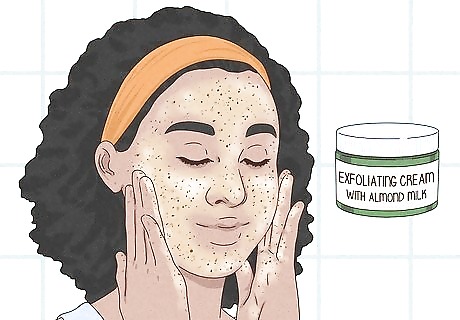
Exfoliate to help prevent hyper-pigmentation and acne scars. Hyper-pigmentation just means your skin is blotchy, and it is common among black people. Sometimes, pimples and acne can leave darker areas. One way to deal with this issue is to use an exfoliant, such as a chemical exfoliant that has alpha or beta hydroxy. Gently rub the exfoliate on your skin then rinse it off. Another option is a physical exfoliant like exfoliating gloves or even a basic washcloth. Just gently rub your wet skin in a circular motion up and down your body.










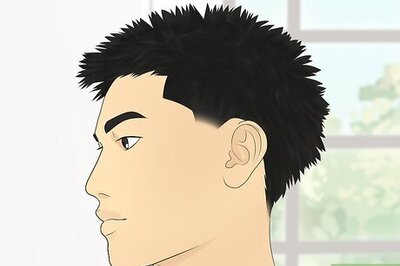








Comments
0 comment